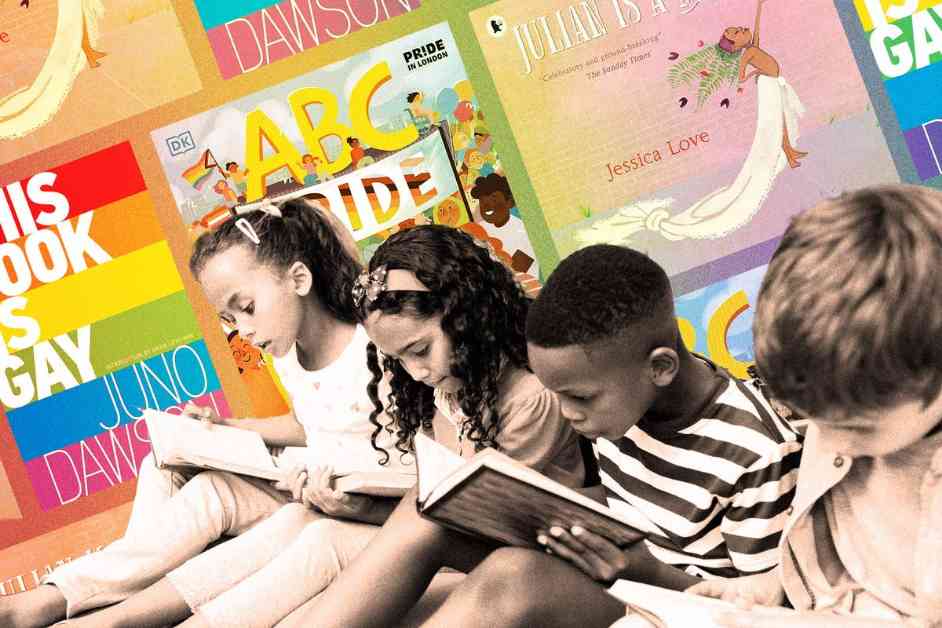Schools across the UK are facing backlash for banning LGBT+ books following parental complaints, as revealed by a six-month investigation conducted by Index on Censorship. The study, shared exclusively with The Independent, found that 53% of school librarians polled had been asked to remove literature from their shelves due to objections raised by parents. In more than half of these cases, books were indeed taken off the shelves, sparking concerns about censorship and limiting access to diverse and inclusive literature in educational settings.
Librarians in the UK have reported experiencing pressure to remove LGBT+ themed books from their collections, with some being instructed to eliminate every book with LGBT+ content following a single complaint from a parent. Specific titles that have been removed from school libraries include “This Book Is Gay” by Juno Dawson, a memoir about a young person discovering their sexual identity; “Julián is a Mermaid” by Jessica Love, a picture book about a gender non-conforming boy dreaming of being a mermaid; and “ABC Pride” by Louie Stowell, Elly Barnes, and Amy Phelps, an alphabet book introducing young readers to the LGBT+ community.
The move to ban LGBT+ books from schools has raised concerns among LGBT+ charities, MPs, and authors, who see it as a troubling regression on gay rights and a threat to the well-being of young LGBT+ individuals. Former MP Elliot Colburn, who faced homophobic threats while in office, warned that preventing children from accessing material that resonates with their experiences poses a clear danger to young LGBT+ people. The censorship of LGBT+ literature in schools not only restricts access to diverse perspectives but also perpetuates discrimination and prejudice against the LGBT+ community.
Simon James Green, a prominent writer of LGBT+ teenage fiction, shared his concerns about the increasing pushback against LGBT+ library books in schools. He noted that the banning of such books has prompted conversations about censorship among librarians, who are now facing more challenges in defending the inclusion of diverse literature in their collections. Librarians who resist book removals risk facing repercussions, such as losing their jobs or being targeted by parents who object to the presence of LGBT+ content in school libraries.
The lack of statutory requirements for schools to provide libraries leaves the decision-making process regarding book collections up to individual schools. Librarians who participated in the survey expressed fears about the influence of agitator groups and the growing trend of censoring LGBT+ books in educational settings. Concerns have been raised that the censorship of LGBT+ literature in schools mirrors similar intolerance seen in the US, where organized efforts to challenge and ban books have been spearheaded by conservative groups.
Stonewall, a leading LGBT+ rights organization, emphasized the importance of inclusive educational materials and books that reflect the diversity of society. Preventing LGBTQ+ young people from accessing literature that represents their identities can contribute to feelings of shame and isolation, further marginalizing LGBT+ individuals. Laura Mackay, CEO of LGBTQ+ young people’s charity Just Like Us, underscored the need for young people to have access to books that reflect the world around them and promote understanding and acceptance of diverse identities.
Political figures from various parties have voiced their concerns about the censorship of LGBT+ books in schools, calling for action to protect the rights of all students to access inclusive and diverse literature. Former Conservative MP Elliot Colburn urged the government to provide guidance to empower schools in addressing complaints related to LGBT+ books, while former Labour MP Ben Bradshaw highlighted the importance of ensuring that all young people have access to age-appropriate books regardless of their sexual orientation or gender identity.
The Department for Education declined to comment on the issue, leaving schools and librarians to grapple with the challenges of navigating parental objections and maintaining diverse book collections in the face of censorship. As the debate over the presence of LGBT+ literature in schools continues, advocates for inclusive education emphasize the importance of promoting empathy, acceptance, and understanding through diverse and representative literature in educational settings.












